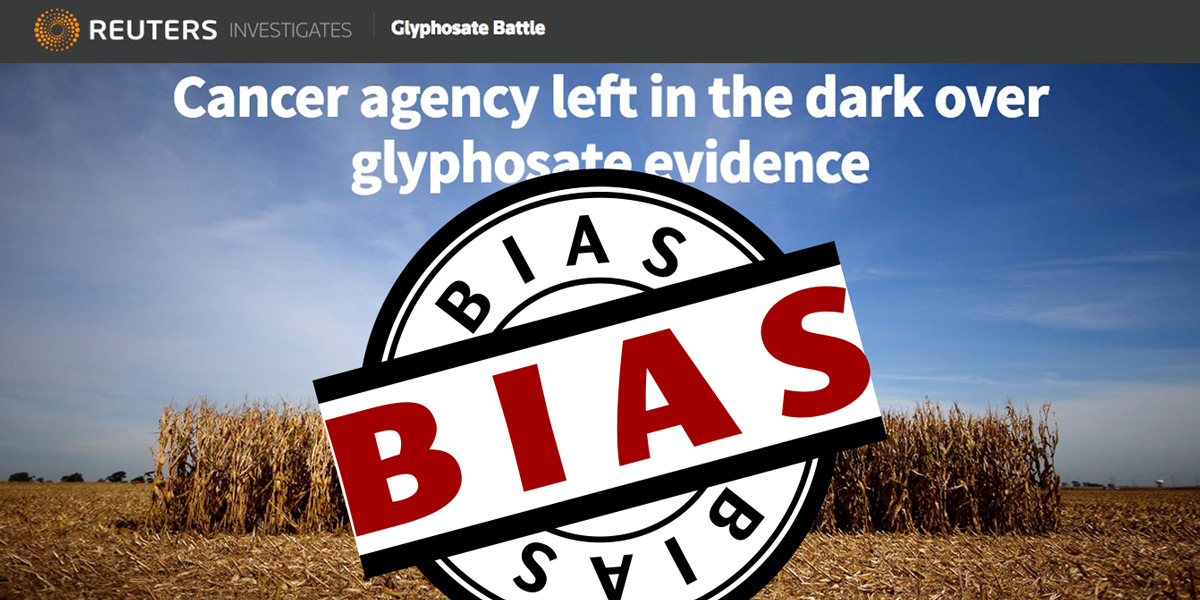
A court transcript shows that contrary to claims by Reuters reporter Kate Kelland, an IARC researcher did not unfairly withhold data on glyphosate – and presents further evidence of a cancer link with the chemical
Monsanto lawyers have accused Dr Aaron Blair, chair of the International Agency for Cancer Research's (IARC) working group on glyphosate, of withholding research data indicating glyphosate did not cause non-Hodgkin lymphoma (NHL) in farmers.
Dr Blair faced the accusations in a questioning session in March, which formed part of a lawsuit in the US in which plaintiffs are alleging that exposure to glyphosate herbicides caused their NHL. A transcript of the session has been published online.
An article by Kate Kelland for Reuters said that Dr Blair had "kept IARC in the dark". But the article provided no link to the transcript and so made it impossible for readers to check how accurately it reflected what Dr Blair had said. Closer examination of his words show that Kelland's piece is both inaccurate and unjust.
Unpublished data cuts both ways
The reason Dr Blair did not tell IARC about the data at the time of the glyphosate assessment was because the analysis was not finalised and the material was not published. IARC has a strict policy of only considering published data.
In fact, the transcript also shows that Dr Blair had other data showing that glyphosate did cause cancer, which he also did not bring to IARC's attention. In this case too, this was because the analysis was incomplete and the data were unpublished. But Kelland makes no reference to the withholding of this unpublished data in her Reuters piece.
Mother Jones goes after Dr Blair
When the Reuters piece came out, Mother Jones magazine promptly jumped onto the bandwagon. Under the heading “A scientist didn’t disclose important data—and let everyone believe a popular weedkiller causes cancer", Kiera Butler rehashed Kelland’s article and quoted the biologist and GMO defender Michael Eisen as calling IARC’s policy on unpublished data “silly”. However, far from being “silly”, refusal to consider unpublished data is the norm in science. Transparency and repeatability are cornerstones of science, which is why peer-reviewed publication is a prerequisite for any data being considered seriously.
By contrast, most industry data that regulators rely on to approve pesticides are unpublished and unavailable to scientists and others to scrutinise, which is why IARC did not consider such secret industry data in its assessment of glyphosate.
As the science and technology policy expert Patrick van Zwanenberg has pointed out, when it comes to comparing the practices of the regulators and IARC, there is no contest. IARC “is about as scientifically rigorous and independent an institution as they come. Its evaluations are conducted by senior academic and regulatory scientists, drawn from around the world, and subject to a strict conflict of interest policy. IARC insists that its evaluations are transparent and so all evidence used to support its evaluations must be publicly available.”
Farmers who sprayed glyphosate over longer time period had higher rate of NHL
Reuters and Mother Jones also failed to report that Dr Blair told the Monsanto lawyer that some of the data indicating that glyphosate did not cause NHL were not statistically significant and that there was evidence of a higher rate of NHL in farmers who had sprayed glyphosate over more days per year.
Other studies discussed in the hearing also showed a higher risk of NHL in farmers who used glyphosate. For example, a study by Eriksson revealed that exposures of more than 10 days per year resulted in over double the risk of NHL.
Monsanto fouling up the process
The unpublished data that the Monsanto lawyer focused on came from a study on which Dr Blair was a co-researcher. The Monsanto lawyer claimed that Dr Blair and one of his co-researchers “have the ability to publish data or not publish data as you … choose”, and yet he chose not to do so, and not to mention it to IARC.
But Dr Blair told the Monsanto lawyer, “No… you foul up the process.” He pointed out that the data “were not yet ready to submit to journals” because they were not yet fully analysed. He also said that the decision of when to publish could not be taken just by him and one other co-researcher. There were “many other authors on the paper” who collectively had to “make the decision when papers are ready for submission for publication”.
Dr Blair also argued the data showed that people who used glyphosate most suffered an "excess" of cases of NHL. "It was still being analysed," he said, and therefore he hadn’t drawn it to the attention of the IARC.
The transcript also shows that Dr Blair declined an invitation to act as an expert witness for the plaintiffs in their case against Monsanto because he wanted to remain independent.
Furthermore, it was clear that other data from a study on which Dr Blair was a co-author showed that farmers who used glyphosate over a long period had over double the risk of NHL. And the results were statistically significant.
When Dr Blair was asked if he still thought that glyphosate probably caused cancer, he replied, “Yes". It was also mentioned that his work was unpaid and that since retiring he had worked in a voluntary capacity on cancer research.
In short, the transcript clearly shows that Reuters’ Kate Kelland was extremely selective and biased in her reporting of this episode. The most charitable explanation would be that she never saw the full transcript of Dr Blair’s comments and was simply spoon-fed by Monsanto.
Further reading
See Dr Michael Hansen’s comments on the Reuters piece and the scientific studies on glyphosate and cancer here:
https://www.ecowatch.com/reuters-monsanto-glyphosate-cancer-2442224413.html
See Carey Gillam’s article on the Reuters piece here:
http://www.huffingtonpost.com/entry/monsanto-spin-doctors-target-cancer-scientist-in-flawed_us_594449eae4b0940f84fe2e57